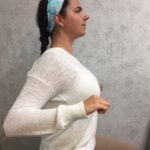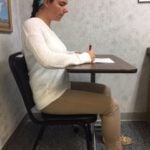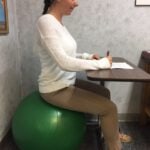 Students beware: summer is passing by quickly…so don’t waste one single minute idly watching TV or playing video games! Finish your reading list and get outside and play! It won’t be long before your parents will begin the end of summer shopping scramble…uniforms, shoes, backpacks, tablets, copy paper etc. Well, the same could be said about preparing for a healthy school year. With the help of local pediatrician, Lori Shipski, MD I offer the following suggestions and hope it will contribute to a healthy and productive school year. Dr. Shipsky says, "New crayons, new backpack, and your yearly flu shot are all key components for 'back to school.” But, just in case, we offer a few additional health tips…
Students beware: summer is passing by quickly…so don’t waste one single minute idly watching TV or playing video games! Finish your reading list and get outside and play! It won’t be long before your parents will begin the end of summer shopping scramble…uniforms, shoes, backpacks, tablets, copy paper etc. Well, the same could be said about preparing for a healthy school year. With the help of local pediatrician, Lori Shipski, MD I offer the following suggestions and hope it will contribute to a healthy and productive school year. Dr. Shipsky says, "New crayons, new backpack, and your yearly flu shot are all key components for 'back to school.” But, just in case, we offer a few additional health tips…
- Buy a good backpack and limit the load
- A good backpack has padded and adjustable shoulder straps and waist strong belt. It is made with solid material and has plenty of reflective material on it.
- Limiting the load means the pack should not exceed 10% of the child’s body weight. For example, if a child weighs 100 pounds, the pack should not weigh more than 10 pounds.
- Consider special needs. If a child has scoliosis or a history of neck, back or shoulder pain, consider purchasing a pack that has wheels and can be rolled instead of carried. Be sure the pack and wheels are made of durable material (avoid weak plastic).
- Healthy diet
- A low sugar, high protein breakfast is a great start to foster learning. Scrambled eggs with veggies, Greek yogurt and fruit, oatmeal and fruit, bananas and peanut butter, or a healthy smoothie are some examples of a healthy breakfast.
- Lunch for most students should not exceed 700 calories with a good mix of healthy carbs, fruits and vegetables, depending on the activity level of the individual. Salads with tuna or chicken salad will do the trick, followed by a low sugar granola bar and piece of fruit.
- Students are encouraged to eat multiple times per day as long as the snacks are healthy. Portion, calorie, quantity, and quality control by parents is recommended. Know your child…one child needs limits while another needs encouragement.
- Daily Exercise
- Students should get 45 to 60 minutes of physical activity every day. This is especially important for those not engaged in a sport. Walk, run, bike, swim, PLAY!
- Proper posture and posture exercises are also essential for a healthy student. Sit up straight and avoid prolonged slouching. Three simple stretches to perform throughout the day are: 1. bring your head over your shoulders, 2. pinch your shoulder blades together. 3. Bend backwards and stretch your back into extension. (PHOTO A, B, C)
- Try to sit at a desk that allows you to put your feet on the floor and sit up straight. When doing homework, sit at a desk instead of a soft couch. If your child is “fidgety” and is tired of sitting all day, consider a standing desk for part of the homework session. Also, sitting on an exercise ball while working at a desk is helpful for those with “high energy” to improve focus. (PHOTO D, E)
- Limit Electronic Time
- Studies show that those children who engage in less than 3 hours of TV/video time per day have significantly better grades than those who stare at the screen for more than 3 hours.
- Sleep
- Sleep deprivation is a common problem for all students (and adults). However, it is well-know that lack of sleep negatively effects learning, retention and academic performance. There are several suggestions to promote a good night sleep. Try to pick a consistent bed time. Stop using electronic devices one hour before bed time. Avoid caffeine products after lunch and try to engage in physical activity after school but not too close to bedtime.
- Well Visits
- Medical Check-up - Plan to see you family physician or pediatrician well before school begins to get your immunizations, sports physical, medications etc.
- Dental/Vision Check-up- Remember, dental is not just about a pretty smile, it is an important part of your overall health. And, it is difficult to read if you can’t see the print or board and squinting will give you a headache!
- Practice Good Hygiene
- Good hygiene not only includes bathing, grooming, flossing and brushing your teeth but also washing your hands regularly. Hand washing throughout the day is one of the most important aspects of illness prevention, especially in public places like a school building.
- Hydrate
- Depending on the weather and activity, students need at least 6-8 drinks per day (and more if active in warm weather) to be adequately hydrated. Ideally, most fluids should come from water. Sports drinks are only necessary when engaged in physical activity that exceeds 60 minutes.
- Time to Chill/Play/Relax
- While organized sports are an important part of our culture and development, it can easily become an unhealthy obsession. Playing one sport year round, including the local team, travel team, and school team has been associated with many muscle and bone injuries due to repetition and lack of rest. Parents need to take control and limit the amount of organized sports and activities in which their children participate. It is unhealthy in many ways; physical injury, stress and anxiety, poor academic performance, mental and physical burnout and a lack of development in other aspects of life.
-

-
Photo A-Head over shoulders
-

-
Photo B-Pinch shoulder blades
-

-
Photo C-Bend backwards
-

-
Photo D-Proper desk posture
-

-
Photo E-Sitting on ball at desk
MEDICAL CONTRIBUTOR: Lori Shipsky, MD, is a pediatrician in Chinchilla, PA in association with Anders Nelson, MD, working with infants, children and adolescents to age 23.
Model: Danielle Higgins
NEXT MONDAY – Read Dr. Paul J. Mackarey “Health & Exercise Forum!”
This article is not intended as a substitute for medical treatment. If you have questions related to your medical condition, please contact your family physician. For further inquires related to this topic email: drpmackarey@msn.com
Paul J. Mackarey PT, DHSc, OCS is a Doctor in Health Sciences specializing in orthopaedic and sports physical therapy. Dr. Mackarey is in private practice in downtown Scranton and is an associate professor of clinical medicine Geisinger Commonwealth School of Medicine.
 Students beware: summer is passing by quickly…so don’t waste one single minute idly watching TV or playing video games! Finish your reading list and get outside and play! It won’t be long before your parents will begin the end of summer shopping scramble…uniforms, shoes, backpacks, tablets, copy paper etc. Well, the same could be said about preparing for a healthy school year. With the help of local pediatrician, Lori Shipski, MD I offer the following suggestions and hope it will contribute to a healthy and productive school year. Dr. Shipsky says, "New crayons, new backpack, and your yearly flu shot are all key components for 'back to school.” But, just in case, we offer a few additional health tips…
Students beware: summer is passing by quickly…so don’t waste one single minute idly watching TV or playing video games! Finish your reading list and get outside and play! It won’t be long before your parents will begin the end of summer shopping scramble…uniforms, shoes, backpacks, tablets, copy paper etc. Well, the same could be said about preparing for a healthy school year. With the help of local pediatrician, Lori Shipski, MD I offer the following suggestions and hope it will contribute to a healthy and productive school year. Dr. Shipsky says, "New crayons, new backpack, and your yearly flu shot are all key components for 'back to school.” But, just in case, we offer a few additional health tips…